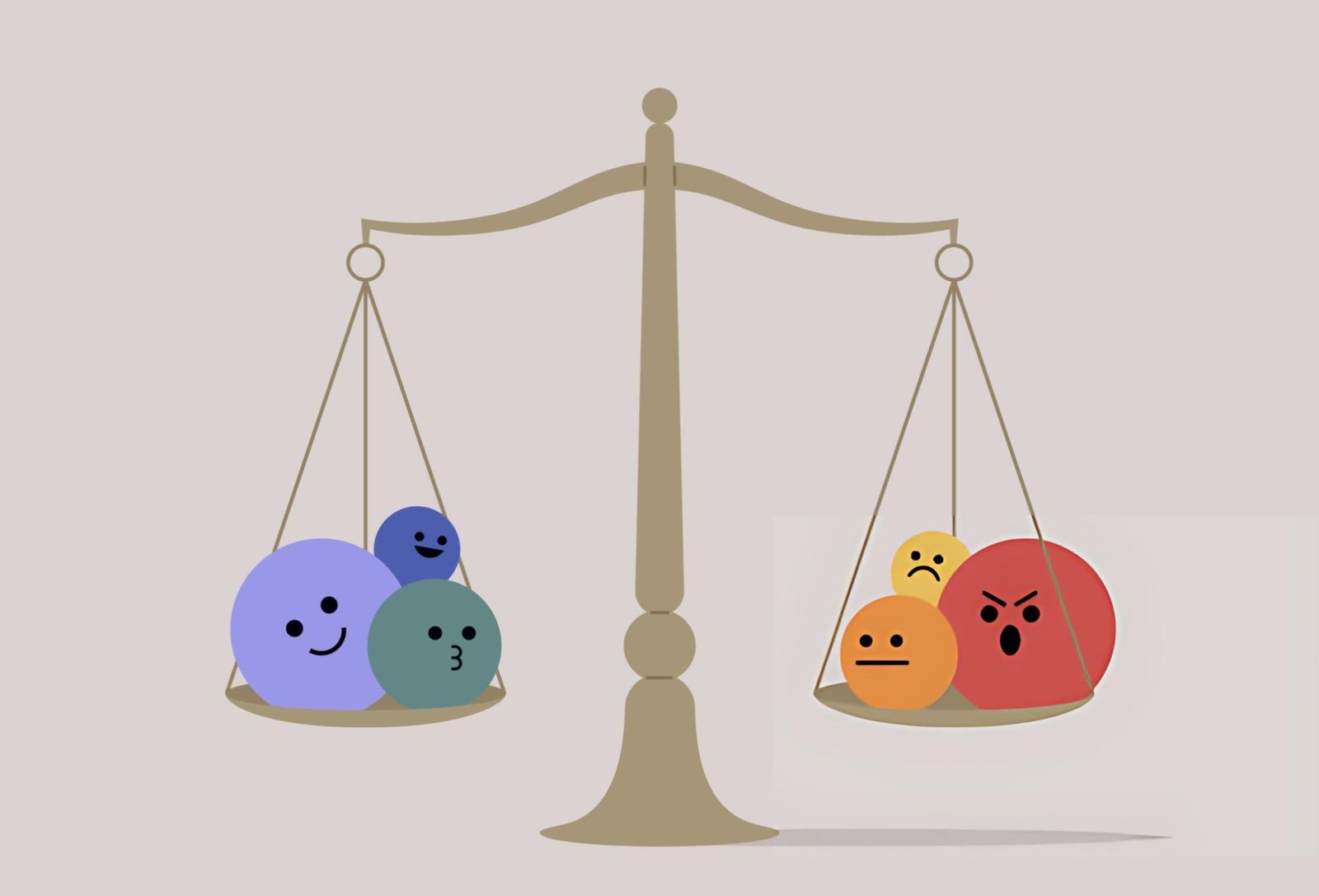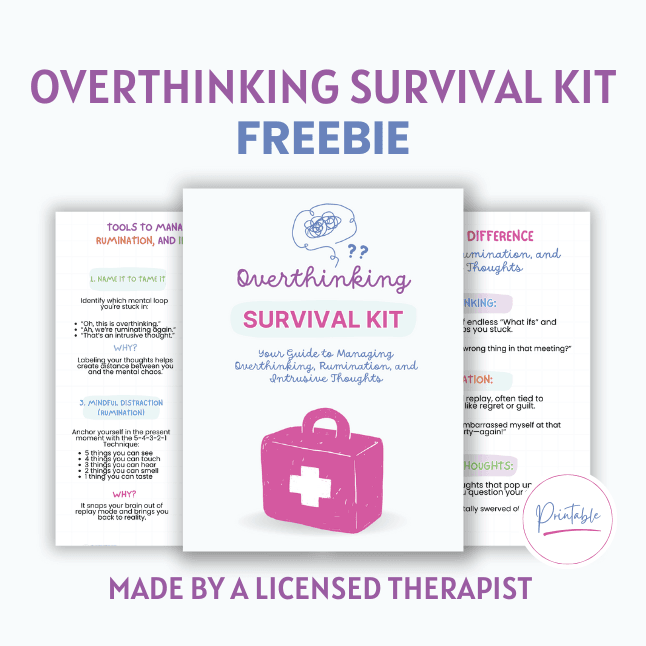Struggling with overthinking? You’re not alone. Learn how to stop overthinking with 5 actionable strategies that will help you regain focus and mental clarity. Plus, grab your free Overthinking Survival Kit for quick relief!
Introduction
Does your mind feel like it’s stuck on a never-ending hamster wheel? The average person has about 6,000 thoughts a day, but for chronic overthinkers, it can feel more like 60,000. Whether you’re replaying awkward conversations or drowning in “what-ifs,” overthinking can leave you mentally exhausted and paralyzed by indecision.
Wondering how to stop overthinking and reclaim your mental clarity? You’re not alone. Overthinking doesn’t just sap your energy; it can also increase stress, disrupt your focus, and keep you stuck in a loop of self-doubt.
But here’s the good news: Overthinking isn’t permanent. With the right techniques, you can quiet your mind, break free from spiraling thoughts, and regain control. Let’s dive into five proven techniques to reduce overthinking and create mental clarity.
How to Stop Overthinking by Identifying Key Patterns
Overthinking often masks itself as productivity—it feels like you’re being thorough or prepared, but in reality, it’s mental quicksand. How do you know when you’re overthinking? Look out for these patterns:
- Analysis Paralysis: Spending so much time weighing your options that you can’t make a decision.
- Endless Replays: Ruminating over past conversations, wondering if you said the “wrong” thing.
- Worst-Case Scenarios: A small worry snowballs into imagining the absolute worst outcomes.
- Restless Nights: Your brain goes into overdrive the moment your head hits the pillow.
Do any of these sound familiar? If so, don’t worry. Awareness is the first step. Now, let’s explore actionable techniques to reduce overthinking.
5 Proven Techniques to Reduce Overthinking and Regain Clarity
1. Anchor Yourself with the 5-4-3-2-1 Grounding Technique
Overthinking often pulls you into a mental fog, making it hard to focus on the here and now. Grounding techniques help reconnect you with the present moment.
Here’s how to use the 5-4-3-2-1 Grounding Technique:
- Name 5 things you can see.
- Name 4 things you can touch.
- Name 3 things you can hear.
- Name 2 things you can smell.
- Name 1 thing you can taste.
This exercise shifts your attention from your racing thoughts to the sensory world around you. The more present you are, the quieter your mind becomes.
2. Write It Out to Untangle Your Thoughts
When your thoughts stay trapped in your mind, they can feel overwhelming and unmanageable. Writing them down can give you clarity and help you release what’s weighing you down.
Try This Exercise:
1. Set a timer for 10 minutes. Write down every worry or thought, no matter how big or small.
2. When the timer goes off, categorize your thoughts:
- Actionable Worries: Things you can control (e.g., preparing for a meeting).
- Uncontrollable Worries: Things outside your control (e.g., other people’s opinions).
3. Focus only on actionable worries and let go of the rest.
Pro tip: This exercise works even better if you journal consistently. Over time, you’ll notice patterns in your overthinking and learn to manage them proactively.
3. Set Boundaries to Avoid Mental Overload
One common cause of overthinking is information overload—when you consume too much data or try to make too many decisions at once. Setting boundaries can help you protect your mental space.
Here’s How:
- Limit Information Intake: If you’re researching a decision, give yourself a time limit (e.g., 20 minutes to compare options).
- Schedule “Worry Time”: Set aside 15 minutes a day to intentionally overthink. During this time, let yourself spiral—but when the timer’s up, redirect your thoughts.
- Say No to Mental Overload: If you’re juggling too many responsibilities, don’t hesitate to delegate or say no to what’s unnecessary.
4. Embrace Radical Acceptance
Fighting reality only makes overthinking worse. That’s where radical acceptance—a concept from Dialectical Behavior Therapy—comes in. It’s about accepting situations as they are, even if they’re not ideal.
Here’s how to practice it:
- Instead of asking, “Why did this happen?” reframe the situation: “This happened, and I can’t change it. What’s the next best step I can take?”
- Remind yourself: Acceptance doesn’t mean approval—it just means letting go of the fight.
This mindset helps you move forward instead of getting stuck in the past.
5. Reframe Negative Thoughts with CBT Techniques
Cognitive Behavioral Therapy (CBT) offers powerful tools to challenge and reframe unhelpful thoughts. Here’s a simple exercise:
- Write Down a Specific Worry: For example, “I’ll fail my presentation.”
- Challenge It: Ask yourself, “What evidence do I have that I’ll fail? Have I succeeded before?”
- Replace It: Swap your negative thought with a positive, realistic one: “I’ve prepared well, and even if I stumble, I can recover.”
Reframing takes practice, but over time, it can transform your thought patterns and help you stay grounded in reality.
A Real-Life Example: How Maya Stopped Overthinking Emails
Maya, a graduate student, spent hours rewriting emails to her professor, worried they’d sound unprofessional. She felt stuck in a loop of perfectionism and doubt.
One day, she tried the 5-4-3-2-1 Grounding Technique before sitting down to write. By calming her racing mind, she realized her anxiety was inflating the stakes. She then set a 10-minute timer to draft and send the email.
The result? It wasn’t perfect, but it didn’t need to be. Over time, this practice helped Maya trust herself and break free from overthinking.
Take Control of Overthinking Today!
Overthinking doesn’t have to control your life. By practicing grounding techniques, journaling, and reframing your thoughts, you can stop the mental spirals and regain clarity and focus.
Ready to break free from overthinking? Download your free Overthinking Survival Kit today and take back control of your thoughts. It’s packed with actionable strategies to help you regain mental clarity!









